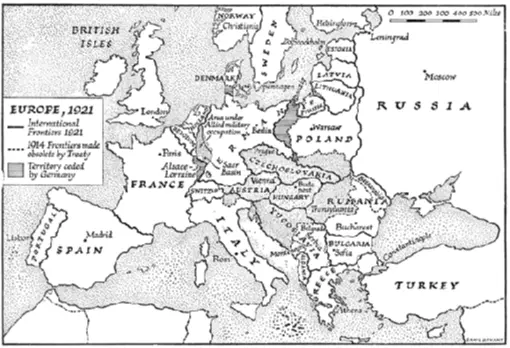The indestructible might “of all the German tribes” would rise once more and the unquenched fires of warrior Prussia glow and burn again. But the Rhine, the broad, deep, swift-flowing Rhine, once held and fortified by the French Army, would be a barrier and a shield behind which France could dwell and breathe for generations. Very different were the sentiments and views of the English-speaking world, without whose aid France must have succumbed. The territorial provisions of the Treaty of Versailles left Germany practically intact. She still remained the largest homogeneous racial block in Europe. When Marshal Foch heard of the signing of the Peace Treaty of Versailles he observed with singular accuracy: “This is not Peace. It is an Armistice for twenty years.”
* * * * *
The economic clauses of the Treaty were malignant and silly to an extent that made them obviously futile. Germany was condemned to pay reparations on a fabulous scale. These dictates gave expression to the anger of the victors, and to the belief of their peoples that any defeated nation or community can ever pay tribute on a scale which would meet the cost of modern war.
The multitudes remained plunged in ignorance of the simplest economic facts, and their leaders, seeking their votes, did not dare to undeceive them. The newspapers, after their fashion, reflected and emphasised the prevailing opinions. Few voices were raised to explain that payment of reparations can only be made by services or by the physical transportation of goods in wagons across land frontiers or in ships across salt water; or that when these goods arrive in the demanding countries, they dislocate the local industry except in very primitive or rigorously controlled societies. In practice, as even the Russians have now learned, the only way of pillaging a defeated nation is to cart away any movables which are wanted, and to drive off a portion of its manhood as permanent or temporary slaves. But the profit gained from such processes bears no relation to the cost of the war. No one in great authority had the wit, ascendancy, or detachment from public folly to declare these fundamental, brutal facts to the electorates; nor would anyone have been believed if he had. The triumphant Allies continued to assert that they would squeeze Germany “till the pips squeaked.” All this had a potent bearing on the prosperity of the world and the mood of the German race.

In fact, however, these clauses were never enforced. On the contrary, whereas about one thousand million pounds of German assets were appropriated by the victorious Powers, more than one thousand five hundred millions were lent a few years later to Germany, principally by the United States and Great Britain, thus enabling the ruin of the war to be rapidly repaired in Germany. As this apparently magnanimous process was still accompanied by the machine-made howlings of the unhappy and embittered populations in the victorious countries, and the assurances of their statesmen that Germany should be made to pay “to the uttermost farthing,” no gratitude or good will was to be expected or reaped.
Germany only paid, or was only able to pay, the indemnities later extorted because the United States was profusely lending money to Europe, and especially to her. In fact, during the three years 1926 to 1929 the United States was receiving back in the form of debt-instalment indemnities from all quarters about one-fifth of the money which she was lending to Germany with no chance of repayment. However, everybody seemed pleased and appeared to think this might go on for ever.
History will characterise all these transactions as insane. They helped to breed both the martial curse and the “economic blizzard,” of which more later. Germany now borrowed in all directions, swallowing greedily every credit which was lavishly offered her. Misguided sentiment about aiding the vanquished nation, coupled with a profitable rate of interest on these loans, led British investors to participate, though on a much smaller scale than those of the United States. Thus, Germany gained the two thousand millions sterling in loans as against the one thousand million of indemnities which she paid in one form or another by surrender of capital assets and valuta in foreign countries, or by juggling with the enormous American loans. All this is a sad story of complicated idiocy in the making of which much toil and virtue was consumed.
* * * * *
The second cardinal tragedy was the complete break-up of the Austro-Hungarian Empire by the Treaties of St. Germain and Trianon. For centuries this surviving embodiment of the Holy Roman Empire had afforded a common life, with advantages in trade and security, to a large number of peoples, none of whom in our own time had the strength or vitality to stand by themselves in the face of pressure from a revivified Germany or Russia. All these races wished to break away from the federal or imperial structure, and to encourage their desires was deemed a liberal policy. The Balkanisation of Southeastern Europe proceeded apace, with the consequent relative aggrandisement of Prussia and the German Reich, which, though tired and war-scarred, was intact and locally overwhelming. There is not one of the peoples or provinces that constituted the Empire of the Hapsburgs to whom gaining their independence has not brought the tortures which ancient poets and theologians had reserved for the damned. The noble capital of Vienna, the home of so much long-defended culture and tradition, the centre of so many roads, rivers, and railways, was left stark and starving, like a great emporium in an impoverished district whose inhabitants have mostly departed.
The victors imposed upon the Germans all the long-sought ideals of the liberal nations of the West.
1 comment